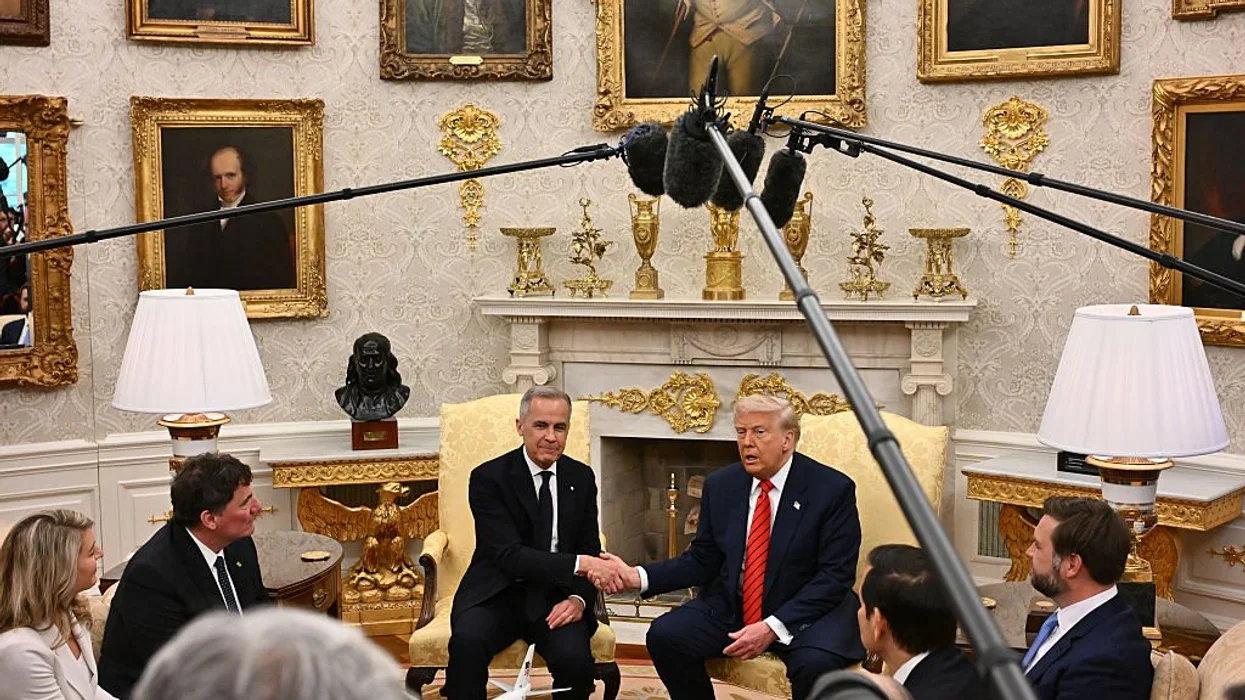UPDATE II -- It has been confirmed: There will be not be a vote tonight on the House bill proposed late Tuesday afternoon:
[blackbirdpie url="https://twitter.com/robertcostaNRO/status/390237293656551424"]
[blackbirdpie url="https://twitter.com/robertcostaNRO/status/390238567013687296"]
UPDATE -- It appears Boehner doesn't have the votes for the House's latest deal:
[blackbirdpie url="https://twitter.com/edhenryTV/statuses/390231296007340032"]
As of this writing, it is unclear where the House goes from here -- but it doesn't look like there will be a vote this evening.
--
The Republican-controlled House proposed a deal Tuesday afternoon that would keep the government funded until Jan. 15 and extend the nation’s borrowing limit until Feb. 7.
The deal would require that Senate Democrats agree to the "Vitter amendment," a proposal that would require members of Congress, their staff and the White House staff enroll in President Barack Obama's new health care law.
It's unclear whether House Speaker John Boehner has the votes to pass the new proposal. Boehner did not say if the plan would be put to a vote Tuesday.
The afternoon deal comes shortly after a deal was put forward by House Republicans Tuesday morning that included a two-year delay of the Obamacare medical device tax and stricter income verification rules for people applying for Obamacare subsidies. The morning deal was rejected outright by the U.S. Senate and the White House.
 Speaker of the House John Boehner arrives at a press conference following a meeting of House Republicans at the U.S. Capitol, Oct. 15, 2013 in Washington, D.C. (Getty Images)
Speaker of the House John Boehner arrives at a press conference following a meeting of House Republicans at the U.S. Capitol, Oct. 15, 2013 in Washington, D.C. (Getty Images)
"I have made clear for months and months that the idea of default is wrong and we shouldn't get anywhere close to it,” Boehner (R-Ohio) told reporters after the original plan was announced.
Some Republicans expressed misgivings about the first deal put forward on Tuesday.
"I have to know a lot more than I know now," Rep. Walter Jones (R-N.C.) said, adding that he’s not sure the deal does enough to tackle the federal debt.
Democrats, for their part, savaged Boehner and House Republicans after the Tuesday morning deal was announced.
The proposal shows that Boehner “once again tried to preserve his role at the expense of the country,” Senate Majority Leader Harry Reid (D-Nev.) said.
House Minority Leader Nancy Pelosi (D-Calif.) called the deal “reckless, radical and irresponsible,” adding that House Republicans are actively “sabotaging a good-faith effort” from Senate.
But at least a few Republicans pushed back on the harsh Democrat rhetoric.
"It's piling on and it's not right," Sen. John McCain (R-Ariz.) said. "To categorically reject what the House and the speaker are doing -- and I think he's pretty courageous in what he's doing - in my view is not serving the American people."
The Democrat-controlled Senate and the White House rejected the first plan outright, calling it nothing more than an attempt by Republicans to appease the Tea Party wing of the party.
The White House praised the Senate for its “bipartisan negotiations” and its “good-faith” efforts to end the partial government shutdown and avoid a potentially disastrous default.
 WASHINGTON, DC - OCTOBER 14: Senate Majority Leader Harry Reid (D-NV) walks through the Capitol building on October 14, 2013 in Washington, DC (Credit: Getty Images)
WASHINGTON, DC - OCTOBER 14: Senate Majority Leader Harry Reid (D-NV) walks through the Capitol building on October 14, 2013 in Washington, DC (Credit: Getty Images)
GOP efforts to chip away at President Barack Obama’s health care law via negotiations over the debt ceiling are "partisan attempt to appease a small group of Tea Party Republicans who forced the government shut down in the first place,” White House spokeswoman Amy Brundage said Tuesday.
The House deals come shortly after senate leaders took over the budget negotiations. Before Boehner announced the first budget deal Tuesday morning, the Senate was working on a plan that would increase the nation’s borrowing limit, end the government shutdown, and delay Obamacare’s $63-per-person fee for anyone who receives health care coverage under an employer-provided plan.
Certain Republicans disapproved of the plan to delay the $63 fee, claiming that it was a special concession to the unions.
The Senate deal also included language that would give federal agencies more room to adjust to the automatic spending cuts, known as sequester, that went into effect in March.
However, after the White House’s automatic rejection of the House’s deal, all Senate negotiations have been put on hold until the House come back with a new (or tweaked) proposal.
Markets kicked off Tuesday hopeful of a possible deal, but they ended in negative territory as once again congressional talks have ground to a halt:
Treasury Secretary Jacob Lew said the U.S. has until Thursday before it hits its borrowing deadline. If it can’t extend its borrowing limit, the Treasury Department would have to use cash on hand and tax revenue
Treasury would have about $30 billion in cash, Lew said.
--
Follow Becket Adams (@BecketAdams) on Twitter
Featured image screen grab. This post has been updated.
[related]

 Speaker of the House John Boehner arrives at a press conference following a meeting of House Republicans at the U.S. Capitol, Oct. 15, 2013 in Washington, D.C. (Getty Images)
Speaker of the House John Boehner arrives at a press conference following a meeting of House Republicans at the U.S. Capitol, Oct. 15, 2013 in Washington, D.C. (Getty Images)


